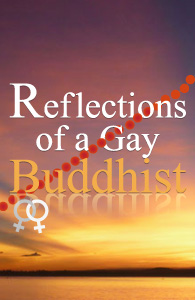Every New Year, I hear people saying optimistically what resolutions they wish to commit to. Usually, the resolutions are to improve ourselves in some way – to be less lazy/to always use condoms/to quit smoking or drinking/to stay faithful/ to lose weight, etc.

While these resolutions are often made with great enthusiasm and optimism, unfortunately, most of the time, the resolutions fizzle out even before the Christmas tree is dismantled.
Why is it, for most of us anyway, so much easier to do ‘bad’ things rather than ‘good’? According to Buddhism, whatever behaviour we are inclined to, be they positive or negative, we are naturally inclined to them because of years, or even lifetimes, of habituation.
It is especially difficult to stop our negative behaviour because we have been doing them for a long time. It’s like a bullock cart which has been going round in the same circle for so long that the cart wheels have made ridges in the ground. To change direction for the wheel is extremely difficult. Likewise, to change our behaviour is also extremely difficult.
Yet it can also be extremely easy.
It is simply a case of deciding to do something and sticking with it. All action comes from a thought, and when we resolve to do something, we create the karma for that action to happen. However we also have a lot of negative karma which can crop up to put a spanner in the works.
We cannot just blame negative karma for stopping us from keeping our resolutions. If stopping being unfaithful to your partner is very difficult, it should be very difficult for everyone. The fact that some people are naturally monogamous and some are not is irrelevant. I’m so envious of those who are naturally monogamous! I have to really work at it. Each of us decides or resolves what we want to do and the strength of our resolve ensures its success.
Whether we keep our New Year’s resolution or not, it doesn’t really affect us that much. When we slip, we just shrug, abandon our resolutions and revert to our previous behaviour without a second thought; usually with some relief that we can forget all about the resolution.
In Buddhism, when we resolve to do something, we make a vow to the Buddhas. We make vows so that we gain merits for every day that we hold our vows. Merits are the accumulation of positive energies which are the result of a positive action done without personal motive. The beneficial energy gained in this way will not be exhausted but propels us further on our spiritual path.
For example, if we are vegetarian, we can take a vow not to eat meat. Therefore, by taking a vow, we gain merits for every day we do not do this activity. If we do not take the vow, we may gain good karma, but not merits. The difference is that karma can be used up while merits do not.
It seems like an easy way to ‘score points’ but it has a flip side. When we take vows and we break them, the negative karma we accrue is likewise quite heavy!
Many people think that taking vows is very restrictive. This is ironic because vows are meant to free us! The vows we take according to Buddhist guidelines are meant to keep us from creating negative karma for ourselves which would hamper or derail our spiritual journey.
It doesn’t mean that Buddhists don’t break their resolutions or vows! Of course many of us do. However, what we do when we break our resolutions is the key. H.E. Tsem Tulku Rinpoche says that after we break our resolution or vow, we must immediately repair it and then continue to hold the vow.
If we made a resolution to quit smoking, and at a weak moment, we bought a pack of cigarettes and had one, we shouldn’t throw our resolution out of the window. We should throw the rest of the pack out of the window. We realise we slipped, we resolve not to do it again, perhaps even think of a repercussion for ourselves to keep us in line (donate 50 bucks to a cancer charity?), and then continue with the resolution.
My friend Roy made a resolution to go to the gym everyday, but after a month, he felt lazy and decided to skip a day. Then it became two days, three days and so on until his gym card started developing cobwebs. He told me – I already skipped a week, I might as well not bother.
Rinpoche always says so what if you skipped a day. That was yesterday. What will you do today and tomorrow?
When we slip, it’s how fast we bounce back that matters, so we shouldn’t focus so much on the slip. Instead, we should think of how we can repair our resolution and get back on the program.
So what’s your New Year’s resolution? And how long will you keep it? Wishing you a very Happy 2010!
Sharon Saw is a writer / editor at Kechara Media & Publications, which focuses on publishing the teachings of H.E. Tsem Tulku Rinpoche, a high incarnate Lama of the Tibetan Buddhist tradition. A selection of Buddhist and non-Buddhist related books from Kechara Publications is now available on Fridae Shop. You can follow Sharon on Twitter. This column will appear every other Friday.
